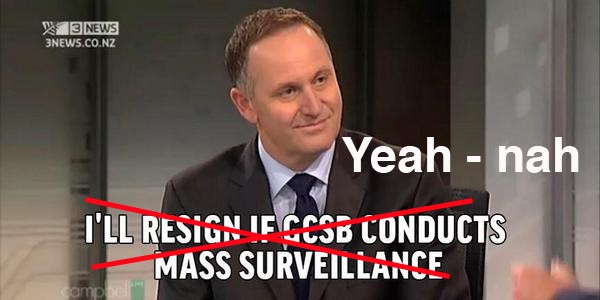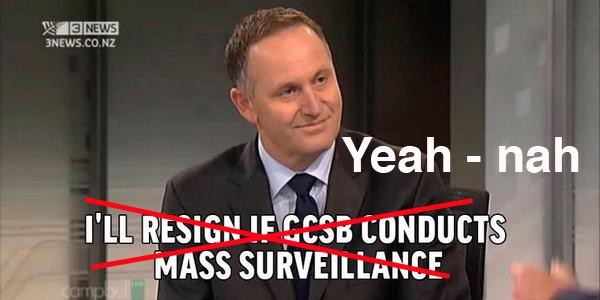According a recent Herald-Digipoll 28% of New Zealanders don’t have confidence in our intelligence services. It will be good if their concerns are elaborated in submissions to the government’s intelligence and security review, scheduled to begin next month and run through until February.
The review’s terms of reference require “a wide range of members of the public [to] have the opportunity to express their views on issues relating to the review.”
The review topics include current intelligence legislation, oversight arrangements, and how our courts deal with classified information. Mentioned for special attention is the Countering Terrorist Fighters legislation, critical provisions of which expire in March 2017.
The terms of reference should have included the controversial issue of whether New Zealand should remain a member of the US-run Five Eyes intelligence network. This issue will no doubt be raised in relation to one of the specific terms of reference, namely “whether the definition of ‘private communication’ in the legislation governing the GCSB is satisfactory.”
Currently, the definition of private communication in the GCSB Act poses a “Catch 22” question. This is because the present definition specifically excludes a communication “in which any party ought reasonably to expect that the communication may be intercepted by some other person.” Given the Five Eyes network (of which the GCSB is a part) is well on the way to being able to intercept any electronic communication, can any phone call, text or email be considered private in terms of the GCSB Act? If not, does this give the GCSB a green light for mass interception of electronic communications without needing to get a warrant?
While the review will provide a platform for critics of our intelligence legislation I would be surprised if the panel comes out with any radical reform proposals. I say this because of who the government has chosen to conduct the review, Sir Michael Cullen and Dame Patsy Reddy.
Sir Michael is an “insider” rather than someone coming from the outside and looking at the issues with fresh eyes. Sir Michael was in charge of the intelligence services on several occasions as Acting Prime Minister when Helen Clark was overseas. For all nine years of the Labour-led government Cullen was on the Intelligence and Security Committee, a toothless oversight body that met for less than one hour a year during Sir Michael’s tenure. I found this out through Written Parliament Questions when I was an MP. In the 2006 parliamentary debate on the House appointing Sir Michael and two others to the five-person committee, I pointed out that the committee had only met for 43 minutes the previous year – enough time for introductions, a very brief briefing and a nice cup of coffee. Sir Michael did not criticise this sad state of affairs.
Thankfully the review’s terms of reference single out “oversight arrangements” as an area meriting a comparison between New Zealand and overseas “best practice”. While there are glaring problems with oversight bodies in most Western nations, New Zealand still has the weakest regime. US Congressional committees have been criticised for their timid response to the Snowden revelations, but they do interrogate the intelligence chiefs in public hearings and in December the Senate intelligence committee issued a stinging report on the CIA’s torture practices.
Finally, our review panel is handicapped by the absence of a human rights lawyer. Cullen’s partner on the review panel, corporate lawyer Patsy Reddy, has the skills to review governance practices within the spy agencies, but the panel also needs a lawyer specialising in civil liberties. Without such a person it will be difficult for the panel to properly assess public submissions proposing changes to the legislation governing the SIS and GCSB to better protect our individual rights and privacy.







“According a recent Herald-Digipoll 28% of New Zealanders don’t have confidence in our intelligence services”
But that means 72% do have confidence…
I would imagine no intelligence service anywhere enjoys much, if any more support than ours. This is a non issue.
A non-issue? A farking non-issue?? No bloody wonder they are getting away with all the illegal spying they are doing.
Dan and Andrew – you seem to give away with privacy so easily?
And yet neither of you seem willing to post your full, real names? Why is that?
1. Is Indigo Prime your real name? 2. Because in all sincerity I believe I have more to fear from the extreme left than the extreme right. 3. Every time you give you name and address to anyone, think about it, online product registration, car WoF, any bill you pay, and so on, you have already potentially given your privacy away to those you dont know, and whom may not be subject to any privacy audit, yet you fear the government?
“Because in all sincerity I believe I have more to fear from the extreme left than the extreme right.”
why?
history says that either extreme will lead to dictatorship – so isnt it more that we ALL have more to fear from those who seek power?
history also says that yes – you should be wary of the govt vis a vis spying.
You think you have something to fear from the extreme Left? That either means one of two things, you fail to realize Right-wing extremists are historically more inclined to violent action, or you’re super rich and are worried about what we’re going to do with you when we finally get justice.
Don’t worry, you’ll only spend the rest of your miserable life in a cell where you belong.
You can find me anytime you fucking like arsehole. There’s only one Daniel Venema in this country.
“The Communist disdains to conceal their views and aims..” I don’t need to be spied on..
Why do I fear the extreme left. Look at your comments “Don’t worry, you’ll only spend the rest of your miserable life in a cell where you belong” “You can find me anytime you fucking like arsehole” So you think I belong in a cell and clearly do not like me. Mind you, Framu has a point, there have been a few right loonies, but not so much in N.Z.
What you gonna do when they come for YOU?!
Ring you Mike. I already know your phone number
72% of Herald Readers, which isn’t exactly a great start to anything cerebral in nature.
Great article Keith.
Excellent points about not having a human rights lawyer. How about Deborah Manning:) She has quite a bit of experience in this field.
What a piece of strategy from the right putting in Cullen. Labour can’t complain, but I fear your analysis is correct, he will have a cup of tea, listen to the carefully prepared Crosby Textor analysis and do a 24 hrs vs 48 hrs suveillance laughing stock Labour compromise.
They use the weakness and lack of knowledge of left individuals to their advantage. Similar to the US Jury selectors who can select the outcome of the trial by selecting and analysising the Jury beforehand.
Another reason, why worldwide, the right keep winning.
CV of Dame Reddy – note the Film commission, Sky City and Oil interests. Can’t see much intelligence or security interests? I would have thought since the Dotcom and GCSB is still ongoing having someone who has chaired the Film commission would be a conflict of interest?
So we have Cullen (who I admire as his minister of finance role) but seems weak on intelligence and Reddy who has no intelligence or human rights experience, but a lot of corporate welfare interests, making decisions on something they seem completely unqualified on.
Shouldn’t there be an international lawyer on human rights? The two reviewing are unqualified to review it. And when people don’t know about something, they tend to keep to the status quo.
The fox minding the hen house again.
Patsy Reddy
Patsy Reddy is a professional director, consultant, and barrister and solicitor and has had experience over the past 25 years as a non-executive director of a range of New Zealand companies. She is currently Chair of the NZ Film Commission, Deputy Chair of NZ Transport Agency, a non-executive Director of Payments NZ Ltd and Active Equities Ltd and Chief Crown Negotiator for Treaty Settlements in the Bay of Plenty region.
Her previous roles include non-executive directorships of NZ Post, Air New Zealand, Telecom, Sky City Entertainment and Southern Petroleum. She has been a member of the NZ Markets Disciplinary Tribunal and a partner in law firm Minter Ellison Rudd Watts. She has also been a lecturer in the Law Faculty at Victoria University of Wellington and a trustee of numerous not-for-profit arts and educational organisations, including the NZ International Festival of the Arts, the VUW Foundation and the NZSO Foundation.
She has a Master of Laws (VUW), is a barrister and solicitor of the High Court and a Fellow of the Institute of Directors.
Tell me is the title Intelligence Service” an oxymoron? I fail to see any intelligence or indeed service.
Thank you Keith for a good summary of the issues.
You point out the Kafkaesque definition of private communications which excludes a communication “in which any party ought reasonably to expect that the communication may be intercepted by some other person.” So that is really confirming that now there really is no such thing as a private communication, since the Snowden revelations we know that ALL communications are vacuumed up for potential later analysis.
If people disagree with this then see the documentary , “Citizen 4” which helps you appreciated the scale of global mass surveillance going on. And as other commentators have pointed out, when we lose our privacy, we lose our freedom of expression.
And when freedom of thought is stifled, that is dangerous for democracy.
Comments are closed.